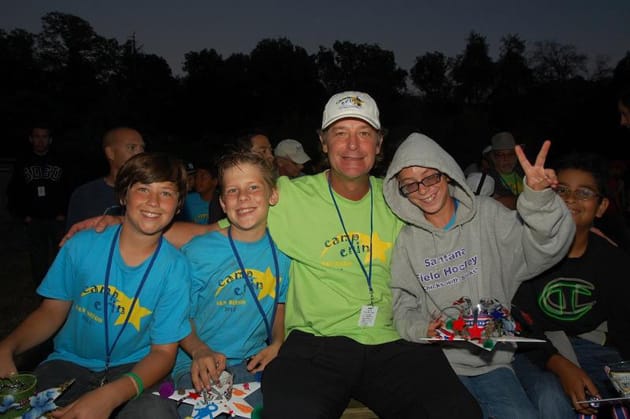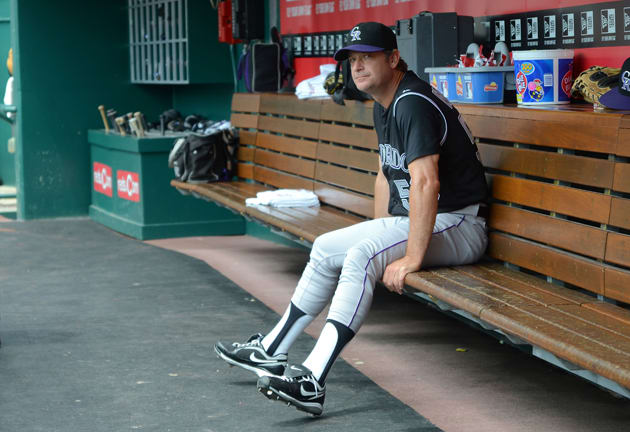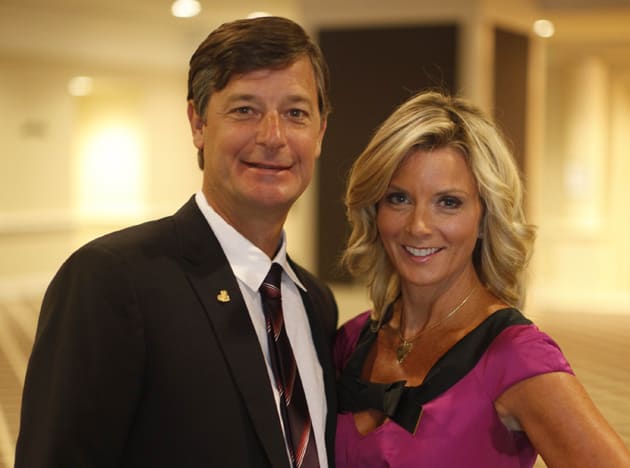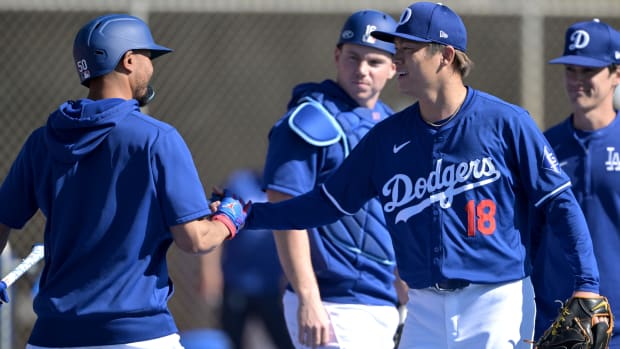
Former pitcher Jamie Moyer supports children dealing with grief, distress
As a pitcher in the major leagues for 25 seasons, Jamie Moyer was known for his longevity, of course, but also for his ability to get hitters out despite not being able to throw a fastball hard enough to -- as they say -- puff a lip. Slow, slower and slowest was said to be his repertoire.
Of course, there was more to it than that. Moyer had pinpoint control, an uncanny ability to feed off a hitter’s aggression and exploit it. His success did not happen by accident.
Moyer pitched in four different decades for eight different teams, but his best years occurred in Seattle, where he went 145-87 between 1996 and 2006, eating up over 2,000 innings in the process. So it is fitting, in a way, that right in the middle of that stint, Moyer and his wife Karen (who is the daughter of former Notre Dame basketball coach and ESPN analyst Digger Phelps) started a foundation that’s a lot like the old left-hander himself -- useful and enduring.

With 45 camps nationwide, Camp Erin is the largest network of free bereavement camps in the country.
Moyer Foundation
After three ACL injuries, UW's Deontae Cooper is still aiming for NFL career
“We came to realize early in my career that the work we did off the field with kids was inspirational to us and gave us strength,” says Moyer. “You see a lot of unfortunate situations out there, whether they’re individual situations or groups situations. And being able to try to make a difference in someone’s life is important. I was touched by so many kids throughout my career and throughout my life and I’ve been inspired by their strength and determination.”
Moyer says it was not one thing in particular that got him started, but from team to team, from city to city, he always sought a connection to the community.
“Karen and I were always involved in some way with the organizations that I played with,” Moyer says. “But we felt like there was more we could do. That’s what spurred us to start our own foundation. We didn’t really have a direction at first, we were just out there trying to get help.”
A couple of years into their work, Jamie and Karen met a young lady named Erin Metcalf through the Make-A-Wish Foundation. Metcalf, 15 at the time, was fighting liver cancer, yet through her own struggles she often spoke about how children struggled with the death of a loved one.

Throughout his career, Moyer pitched in four different decades for eight different teams.
Mark Cunningham/MLB Photos via Getty Images
“Here was an inspirational teenager dealing with something she didn’t ask for,” Moyer says. “She was waiting for a liver transplant, not feeling well at all, but she cared for other kids. She had a very compassionate spirit. We became close friends with her family. She passed away in 2000 and one of her wishes for her family was to continue to working with kids.”
So, the Moyer Foundation started a camp which it named after Metcalf, Camp Erin. The focus is to help children who are dealing with the loss of a loved one. Moyer says that 1.5 million kids in the U.S. lose a family member annually. In many cases that loved one is a parent.
“We now have 46 camps around the country,” Moyer says. “One in every MLB city. A couple in Canada. We are able to serve more than 2,800 kids annually through this type of camp.”
Revolution's Kevin Alston overcomes leukemia, aims for MLS Cup triumph
Moyer describes the weekend camp as largely traditional, full of games and outdoor activities. But intertwined are something Moyer calls “grief activities.”
“It’s a place for these kids to come and deal with their loss,” Moyer explains. “They don’t have to feel like an outsider. Think about if you were 10-12 years old and you lost someone in your life. You go back to school and suddenly you feel different. Especially if it’s a parent a grandparent or sibling. You start pulling yourself out of your groups and maybe going down wrong paths.”
At the camp, Moyer says, kids see other kids going through similar situations. They’re all dealing with a loss. They have professional group counselors who teach the kids coping skills. But more than anything, the children are allowed to open up around kids who can relate. Even though they’ve been running the camp for 14 summers, Moyer still gets emotional talking about it.

Jamie and Karen Moyer founded the Moyer Foundation in 2000 to help support children in distress.
www.camperinparents.com
“The stories you hear at a grief camp, you can imagine, everything from an accident to a tragedy,” Moyer says. “Imagine how it turns a kid’s world upside down. Now imagine being able to be in a place where you don’t feel like an outsider. You don’t feel different. I think that’s a big part of it. So often, these kids feel like they’re the only ones dealing with a loss. Everybody deals with grief in their own way. There’s not a handbook out there. Some of these kids come to camp kicking and screaming. But many go home and ask, ‘When can I go back?’”
So inspired were the Moyers with the success of Camp Erin, that in 2007, after Jamie joined the Phillies, they started a spin-off camp for children aged 9-12, impacted by addiction in their family.
After five years in the Navy, Mitch Harris chases his big league dream
“We had taken custody of a niece whose mother was struggling with addiction,” Moyer says. “As a part of the court mandate we were required to get her professional counseling and support. We immediately saw the need to help children who were in similar situations.”
Like Camp Erin, Camp Mariposa is a free, weekend camp with traditional activities that are combined with sessions to help children deal with some really difficult issues.
“Let me throw some numbers at you,” Moyer says. “There are more than 8.3 million children in the U.S. who live in a home with a parent in need of treatment for alcohol or substance abuse. And children who are living with an addict are four times more likely to develop substance abuse problems of their own. Ninety-five percent of addicts start to use drugs or alcohol before the age of 20. The whole goal of Camp Mariposa is to intervene before the problem develops.”
Because Moyer pitched for such a long time -- he won his final major league game in 2012 at the age of 49 years, two months, making him the oldest pitcher in MLB history to record a W -- and started his foundation more than a decade before he retired, the camps are by no means filling a void for him and Karen. Moyer says the foundation has let him continue as always.
“My wife has been the driving force behind all of this,” Moyer says. “She’s put in countless hours. Whether it’s working in the office. Whether it’s being an advocate for these kids. Or even going to the camps. Now that I’m out of the game, it’s given me an opportunity to become more involved. The satisfaction of playing baseball and contributing to teams was one of the driving forces for me as an active baseball player. And you realize if you as an individual bring something to a team you can make a difference. Now, being away from baseball, being a part of our foundation and camps, I am still a part of a team. It’s just a different stage.”
For more from the Inspirations series of uplifting stories, click here.



































